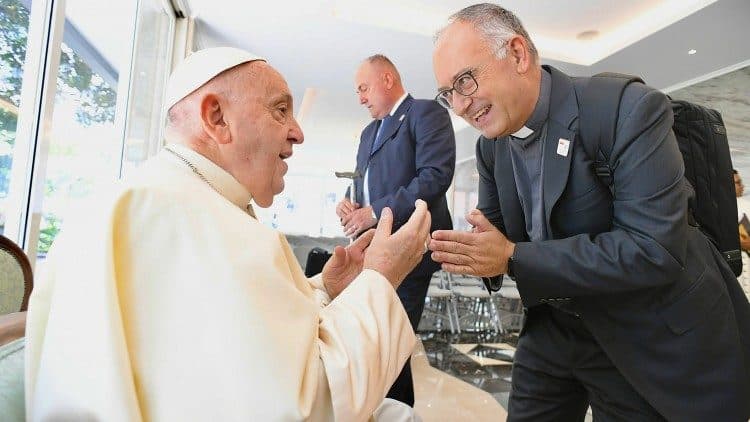ROME – Despite conflicts with Pope Francis on matters ranging from immigration and climate change to China and the Middle East during Donald Trump’s last stint in the White House, a senior Vatican official has said that during his new term, Rome intends to “seek dialogue.”
Italian Jesuit Father Antonio Spadaro, under-secretary of the Vatican’s Dicastery for Culture and a close advisor to Pope Francis, spoke on Wednesday in interviews with Italian news agencies.
Adnkronos, for example, quoted Spadaro to the effect that the Vatican hopes for dialogue with Trump on matters both domestic and international.
Dialogue is needed, Spadaro said, first of all “for a better American society, where it’s obvious that many people don’t feel at home, where they don’t feel recognized and protected, and there’s a cry to be heard.”
In international terms too, Spadaro said, dialogue between Washington and Rome is crucial.
“The perspective of the Holy See is always broad, international, recognizing that the United States has an important role in avoiding that the conflicts currently under way in the world, from martyred Ukraine to martyred Palestine, don’t get worse.”
“It’s necessary to find solutions,” he said.
ANSA reported that Spadaro said the well-known contrasts between Francis and Trump on many issues don’t have to be an impediment to dialogue.
“The Holy See has never divided the world into good guys and bad guys, closing the doors to the latter and opening them to the former for building political alliances,” he said.
“Catholics don’t have homogenous party affiliations or political convictions in the United States or anywhere else,” he said. “It’s held the compass of values steady, but without taking sides, precisely to avoid a spurious mixing of religion with politics.”
“Dialogue and diplomacy are useful precisely for building bridges and knocking down walls,” Spadaro said.
Spadaro suggested that in the past, Trump himself sometimes has appeared to combine religion and politics, citing his 2018 State of the Union address – a tendency, Spadaro said, which is “problematic,” but which makes dialogue with the Vatican “not only desirable, but necessary.”
Spadaro also appeared to issue an indirect challenge to Trump, referring to his “Make America Great Again” mantra.
The true measure of greatness, Spadaro said, will be America’s “attention to the poor, the marginalized and the needy who, like Lazarus, stand outside our door. This applies for the many, too many, forgotten persons in America who feel they no longer belong. It also applies to migrants, who’ve constituted the very fabric of American society.”
Spadaro’s comments so far represent the lone public statement by a Vatican official on the outcome of the elections. Vatican News, the official state-run news agency, carried an article on Trump’s reelection emphasizing the against-the-odds nature of his comeback.
“His political career is considered an unprecedented feat, having managed to return to the White House after two impeachments, various trials, and two criminal convictions,” the Nov. 6 article said. “After the assault on Capitol Hill, his downward spiral seemed definitive, having been abandoned even by his own party, which he managed to reconquer.”
Generally speaking, popes don’t send official messages to new American presidents until their inauguration. There is precedent for breaking that protocol – Pope Benedict XVI, for instance, dispatched a congratulatory note to Barack Obama immediately after his election in November 2008 – although the last time with Trump, in 2016, Francis waited for inauguration day before writing to the new American leader.













